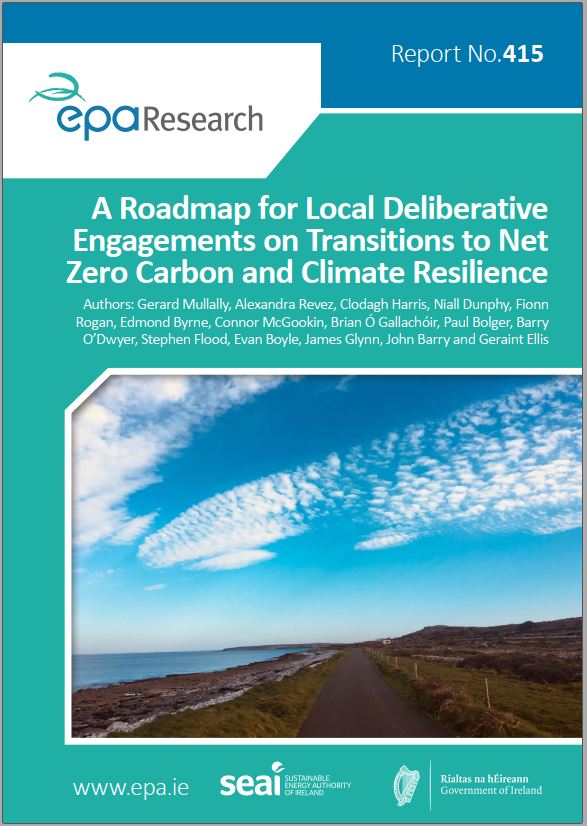Research 415: A Roadmap for Local Deliberative Engagements on Transitions to Net Zero Carbon and Climate Resilience
Authors: Gerard Mullally, Alexandra Revez, Clodagh Harris, Niall Dunphy, Fionn Rogan, Edmond Byrne, Connor McGookin, Brian Ó Gallachóir, Paul Bolger, Barry O’Dwyer, Stephen Flood, Evan Boyle, James Glynn, John Barry and Geraint Ellis
Summary: Ireland faces considerable challenges in transitioning to a net-zero carbon and climate resilient future. This research focused on the challenge of engaging citizens and communities in climate action while also recognising that new and novel approaches are required to enable the transition to climate resilience. The co-creation of the Deliberative Futures Toolkit together with local, scientific and policy communities, provides a resource that can be used by communities and policymakers.

Project Highlights
Watch the project highlights video
Identifying Pressures
Ireland faces considerable challenges in transitioning to a net-zero carbon and climate resilient future. Imagining 2050 focused on the often overlooked challenge of engaging citizens and communities in climate action while also recognising that new and novel approaches are required to enable the transition to climate resilience. The transition requires technological and political responses as well as a wider societal response. Individuals and communities must be engaged, informed, willing to participate and change their behaviour, and they must feel empowered that they have influence and a role to play in deciding the direction of this response. Deliberative approaches like the Irish Citizens’ Assembly and the National Dialogue on Climate Action (NDCA) play an increasingly important role in informing both policymakers and the national conversation, but this must be broadened to include local engagement and action in response to the scale of social changes that will need to be addressed.
Informing Policy
Imagining 2050, hosted by the Environmental Research Institute in UCC in partnership with Queen's University Belfast (QUB), developed innovative techniques and tools to support citizens and communities in engaging with climate change, and to envision future pathways for a net-zero carbon and climate resilient Ireland. Imagining 2050 has consolidated existing research capacity in UCC and QUB on i) societal transitions, ii) climate mitigation, iii) climate adaptation and combines them with iv) innovative participative and deliberative methods. A key innovation in the project was a recursive and iterative process combining deliberative processes with technical scenario analysis to envision and co-produce pathways for a low carbon, climate resilient Ireland. The project offers a roadmap for informing local deliberative engagements for achieving these goals. The project findings, tools and outputs are playing a key role in informing national climate action policy and the NDCA.
Developing Solutions
Imagining 2050 introduced a novel approach that we termed the ‘deliberative futures workshop’, which integrates deliberative dialogues into wider democratic and multi-stakeholder systems. Central to the project’s success was its ability to harness the extensive cross-disciplinary nature of the team and the trans-disciplinary nature of the research. The co-creation of the Deliberative Futures Toolkit together with local, scientific and policy communities, provides a resource that can be used by communities and policymakers. It is generating significant interest among a range of actors seeking to engage in a deliberative way with communities in climate action discourse and in co-developing and implementing climate action solutions. The toolkit includes a range of interactive tools that can be integrated into the deliberative process and that encourages dialogue through the use of visual future-oriented methodologies. We offer insights into pathways for transition at the local level and a multi-stakeholder appraisal of these pathways using the Delphi Method to ascertain areas of divergence and synergies between these visions and those of other groups, such as policymakers and researchers.
https://www.epa.ie/media/epa-2020/research/epa-funded-research/Report-cover-415.jpg